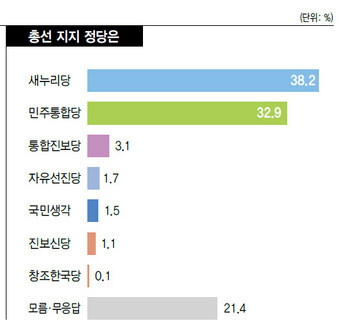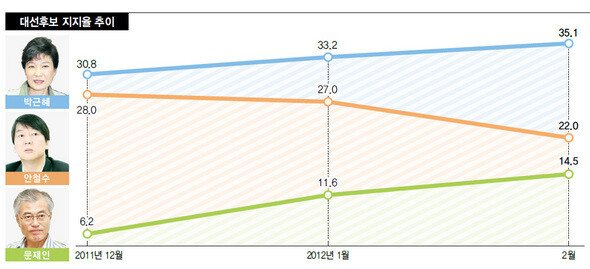hankyoreh
Links to other country sites 다른 나라 사이트 링크
Survey shows conservatives leading ahead of election

By Son Won-je and Im In-tack
A recent survey shows the Saenuri Party leading the Democratic Unity Party by 5.3% ahead of April’s general elections. Survey respondents also showed more trust in the SP‘s efforts to reform their nomination process for the elections.
On February 24 and 25, the Hankyoreh and the Korea Society Opinion Institute conducted a phone survey of 800 voters. The results indicated that 47.3% of respondents claimed to trust the SP’s nomination and other reform efforts more than those of the DUP, while 38.5% favored the DUP‘s efforts. This shows that the SP has capitalized on the public demand for reform, while the DUP has yet to produce results on the matter.
When asked which party they would vote for in the April 11 general election, 38.2% of respondents said the SP, and 32.9% that they would vote for the DUP. These were followed by the Unified Progressive Party with 3.1%, the Liberty Forward Party with 1.7%, K Party with 1.5% and the New Progressive Party with 1.1%.
Regarding issues of contention for voters, 49.2% of respondents answered they would pass judgment on the Lee Myung-bak government and the ruling party, while 29.2% responded that it would pass judgment on opposition parties. The argument that the election would be a judgment was therefore strongly dominant over SP emergency committee chairwoman Park Geun-hye’s suggestion that the vote would be a judgment on the opposition. 56.7% answered that the SP, with its new name and logo, was basically unchanged from the Grand National Party, while 36.8% answered that it was changing into a new party.

In a multi-candidate opinion poll for the presidential election, a rapid advance by senior DUP advisor Moon Jae-in was found. Seoul National University Graduate School of Convergence Science and Technology dean Ahn Cheol-soo, who has not stated whether he will join the race, saw his support fall.
After soaring from 5.2% in December last year to 11.6% in January, Moon‘s support rate rose again to 14.5%. The increase in support for Moon appears to result from recent actions, including running in Busan in the April general election and attacking Park Geun-hye’s Jeongsu Scholarship Foundation. .
Park Geun-hye‘s support rate, too, has continued to rise, albeit by small margins, growing from 30.8% to 33.2% to 35.1% over the same period.
In the poll based on a two-candidate race, Ahn was ahead of Park by 50.7% to 44.0% when running as a unified opposition candidate. The survey showed if Moon ran against Park in a two-horse race, he would lose by 38.3% to 51.3%. Results from the January survey showed Moon losing to Park by 39.7% to 52.1%.
An interesting change could be seen if Ahn doesn’t run in the election. Data shows that if Ahn chooses not to run, it would only benefit the ruling party by four percentage points. The opposition would gain 12 percentage points.
In a multi-candidate scenario, Moon, who is currently receiving 14.5% support, would enjoy a new rate of 21.7%, or a 7.2 percentage point increase, in the event that Ahn chose not to run. Ahn‘s not running would bring percentage point increases in support of 2.2 for Unified Progressive Party leader Rhyu Si-min, 1.4 for lawmaker Chung Dong-young and 1.0% for former party leader Sohn Hak-kyu. The advantage to Park Geun-hye would be an increase of no more than 2.8 percentage points, from 35.1% to 37.9%.
“The situation is one where conservatives’ focus on Park Geun-hye is intensifying as strong opposition candidates emerge,” said Yun Hui-ung of KSOI. “It appears that many moderates and unaffiliated candidates will put off actually making a choice in the event that Ahn does not run.”
Please direct questions or comments to [englishhani@hani.co.kr]
Editorial・opinion
![[Column] Park Geun-hye déjà vu in Yoon Suk-yeol [Column] Park Geun-hye déjà vu in Yoon Suk-yeol](https://flexible.img.hani.co.kr/flexible/normal/500/300/imgdb/original/2024/0424/651713945113788.jpg) [Column] Park Geun-hye déjà vu in Yoon Suk-yeol
[Column] Park Geun-hye déjà vu in Yoon Suk-yeol![[Editorial] New weight of N. Korea’s nuclear threats makes dialogue all the more urgent [Editorial] New weight of N. Korea’s nuclear threats makes dialogue all the more urgent](https://flexible.img.hani.co.kr/flexible/normal/500/300/imgdb/original/2024/0424/7317139454662664.jpg) [Editorial] New weight of N. Korea’s nuclear threats makes dialogue all the more urgent
[Editorial] New weight of N. Korea’s nuclear threats makes dialogue all the more urgent- [Guest essay] The real reason Korea’s new right wants to dub Rhee a founding father
- [Column] ‘Choson’: Is it time we start referring to N. Korea in its own terms?
- [Editorial] Japan’s rewriting of history with Korea has gone too far
- [Column] The president’s questionable capacity for dialogue
- [Column] Are chaebol firms just pizza pies for families to divvy up as they please?
- [Column] Has Korea, too, crossed the Rubicon on China?
- [Correspondent’s column] In Japan’s alliance with US, echoes of its past alliances with UK
- [Editorial] Does Yoon think the Korean public is wrong?
Most viewed articles
- 1‘We must say no’: Seoul defense chief on Korean, USFK involvement in hypothetical Taiwan crisis
- 2N. Korean delegation’s trip to Iran shows how Pyongyang is leveraging ties with Moscow
- 3‘Weddingflation’ breaks the bank for Korean couples-to-be
- 4Will NewJeans end up collateral damage in internal feud at K-pop juggernaut Hybe?
- 546% of cases of violence against women in Korea perpetrated by intimate partner, study finds
- 6[Column] Park Geun-hye déjà vu in Yoon Suk-yeol
- 7“Parental care contracts” increasingly common in South Korea
- 8[Column] Yoon’s first 100 days should open our eyes to pitfalls of presidential system
- 9[Interview] Dear Korean men, It’s OK to admit you’re not always strong
- 10[Editorial] New weight of N. Korea’s nuclear threats makes dialogue all the more urgent